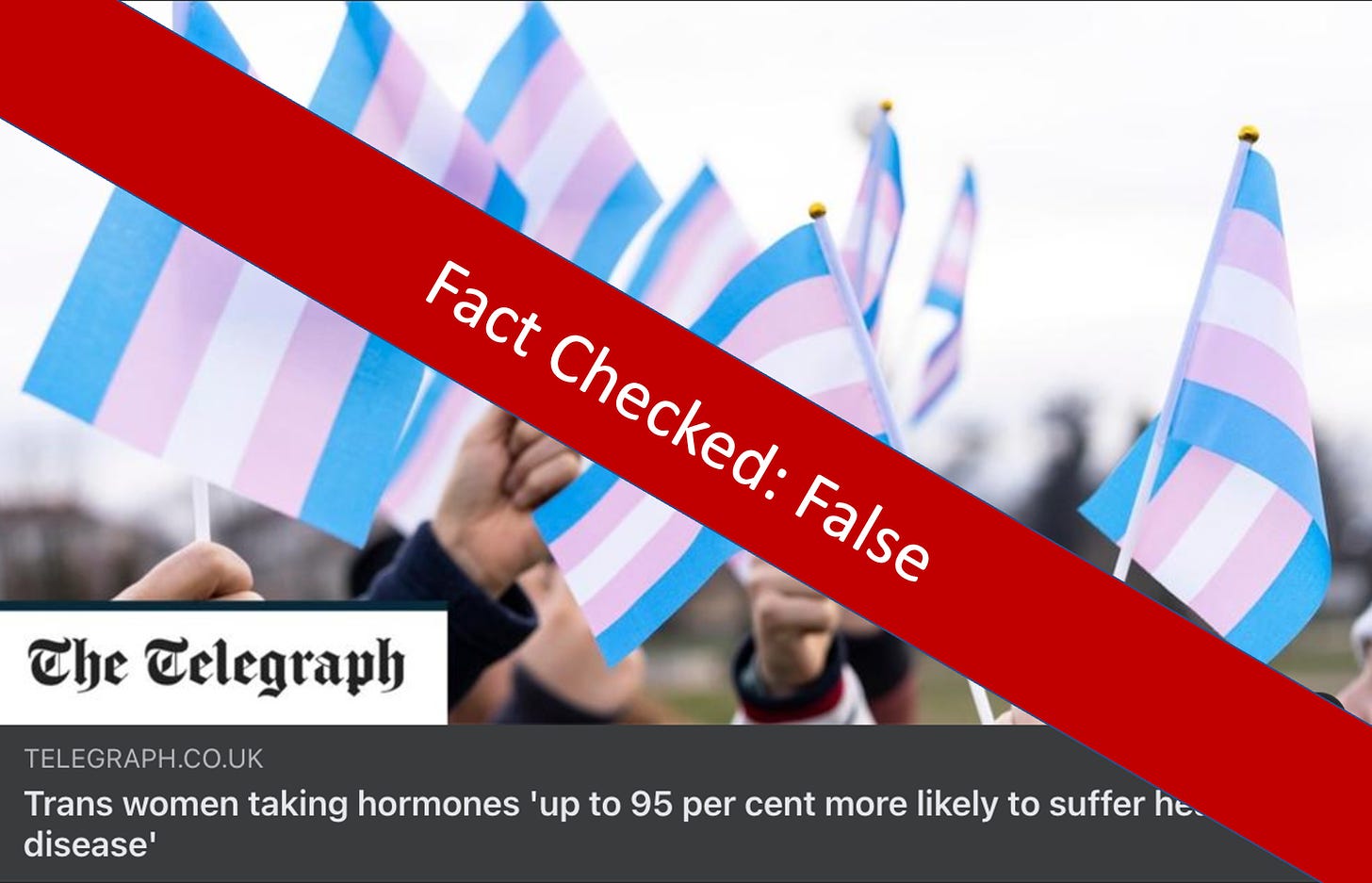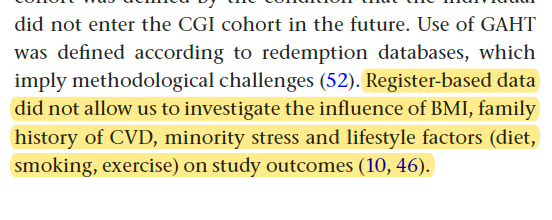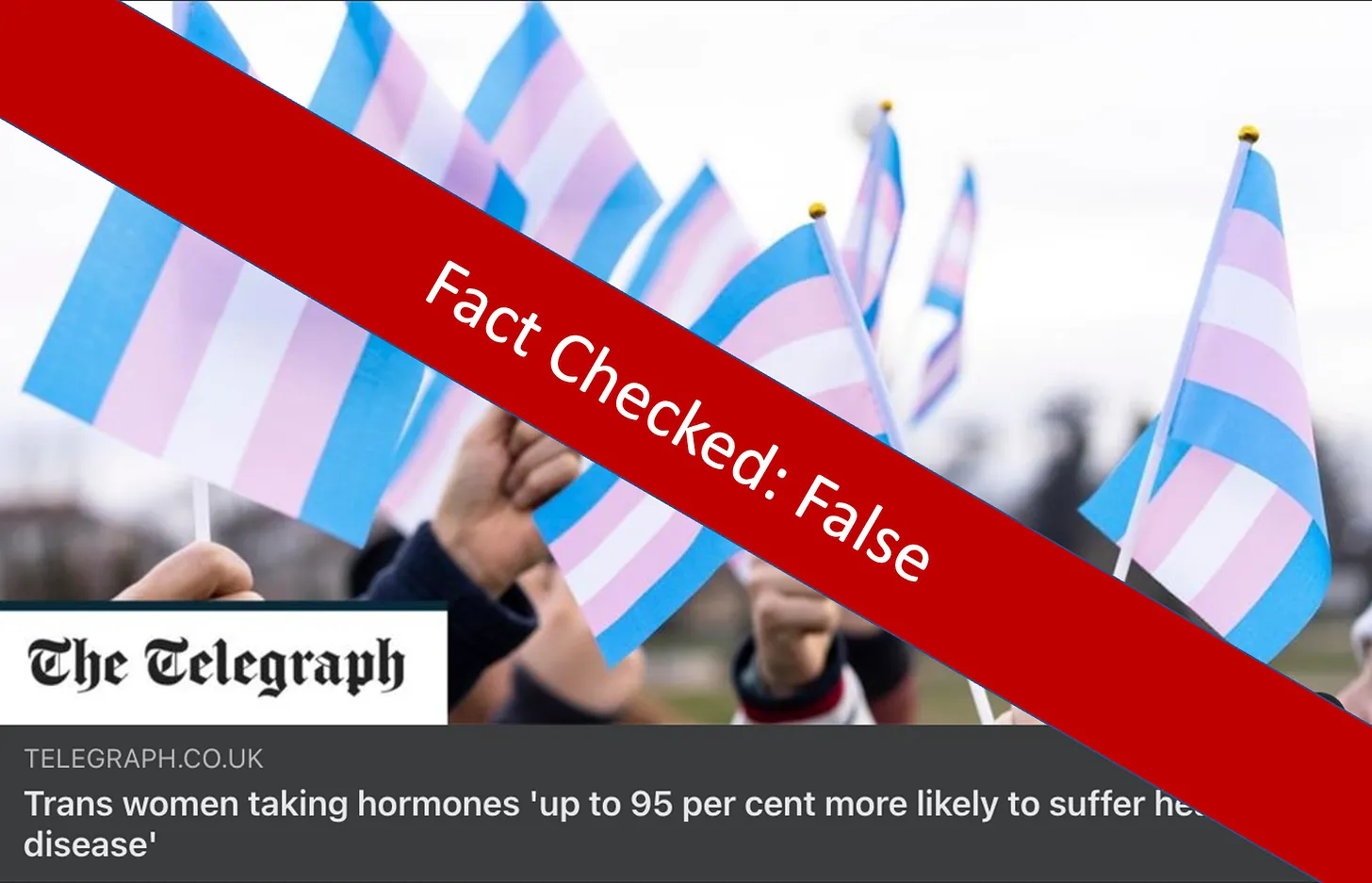Rating: Transsupportive, Erin in the Morning, October 7, 2023 (PDF archive) (HTML archive) (Take Action)
Action Recommendations
- Suggest/Improve an Action on the GenderMenace.net Action Portal!
Content Summary
No, Trans Hormone Therapy Does Not “Increase Heart Disease By 95%”

On Saturday, a flurry of inaccurate headlines and social media posts proliferated across the internet, alleging that “trans women taking hormones” have a 95% increased risk of heart disease (CVD). The implication was clear: gender-affirming care could be dangerous, even life-threatening, for those depending on it. This study, however, is not new. First published in 2022, it is misleadingly being portrayed as recent by certain anti-trans disinformation accounts and right-wing media platforms. Contrary to the claims in these headlines, the study does not substantiate any of these negative assertions. Rather, it explicitly determines that estrogen therapy for transgender women does not correlate with a rise in cardiovascular disorders. The study also notes that the slight association with testosterone can potentially be attributed to factors the study didn’t account for, such as cigarette smoking, high BMIs, and particular lifestyle factors.
The study examined patients recorded in Danish health registries, comparing transgender men and women to cisgender counterparts, while nonbinary individuals were not included. Data collected encompassed hormone therapy usage, income, and various health outcomes like diabetes and heart disease. The research did identify an elevated risk of heart disease among transgender individuals. However, this risk was not connected to HRT for transgender women and was only marginally linked to HRT for transgender men. The study also intentionally adopted a broad definition of heart disease, encompassing hypertension and elevated blood lipids, which make up the vast majority of CVD diagnoses. Interestingly, the study found a non-significant decrease in risk among transgender women taking hormone therapy when compared to cisgender women.

Though transgender women saw no increased risk of cardiovascular disease from their usage of hormone therapy, transgender men on testosterone did see a small increase; however, the study points out that only 30% of the raise in cardiovascular risk might be attributed to the usage of testosterone itself. Even still, it would be inaccurate to conclude (as the study itself cautious many times) that gender affirming care increases heart disease for trans men, due to another major limitation of the study: it did not control for lifestyle factors such as smoking, drinking in excess, body mass index, stress, and more.

Lifestyle factors are enormously important when studying the transgender population. In fact, given that trans women saw a 93% increase in heart disease and none of that increase could be explained by estrogen usage, it is likely that lifestyle factors lead to significantly increased heart disease outcomes and are entirely explanatory for the rise. These factors can include fear of doctors visits, lower rates of exercise, minority stress, elevated levels of depression and anxiety, and higher BMIs. They also may include the biggest heart disease risk of all: smoking.
Numerous studies indicate that transgender individuals, much like their LGBTQ+ counterparts, have a higher propensity to smoke compared to the broader population. One particular study highlighted that both transgender men and women smoke more frequently than cisgender individuals, with transgender men smoking at double the rate of transgender women. Considering potential unique correlations between smoking and testosterone therapy in transgender men, combined with their elevated smoking rates, the slight risk increase attributed to testosterone in the study may not be directly due to the hormone, a point which the study itself concedes. This viewpoint is further supported by another comprehensive study released this year, which determined that testosterone therapy in trans men showed no uptick in CVD risk, casting even more doubt on the headlines.
Despite the unequivocal conclusion that gender-affirming care is not statistically linked to a higher risk of CVD for transgender women and might not be the cause for the elevated risk in transgender men, certain right-wing media outlets and anti-trans groups disseminated misleading headlines that garnered millions of views. The Telegraph ran an article with the headline “Transgender Women Taking Hormones Up To 95% More Likely To Suffer Heart Disease.” The New York Post echoed a similar sentiment. Organizations peddling pseudoscience, like Genspect – which advocates for “alternative treatments” for gender dysphoria – falsely claimed that “using cross sex hormones significantly increased risks of deadly conditions like heart attacks and strokes,” an assertion the study didn’t back. A post containing this disinformation from the right-wing Twitter account Disclose.tv amassed 1.2 million views.
Disinformation surrounding transgender care is rampant and frequently infiltrates legislative hearings. Many of these hearings propagate unfounded assertions like “80% of transgender people desist” or that transgender individuals face “19x higher suicide rates after transition,” even though experts have consistently refuted these claims. It’s inevitable that this headline will resurface in upcoming legislative discussions. Ensuring robust journalism that actively counters such disinformation is crucial to preventing its further spread.


Leave a Reply